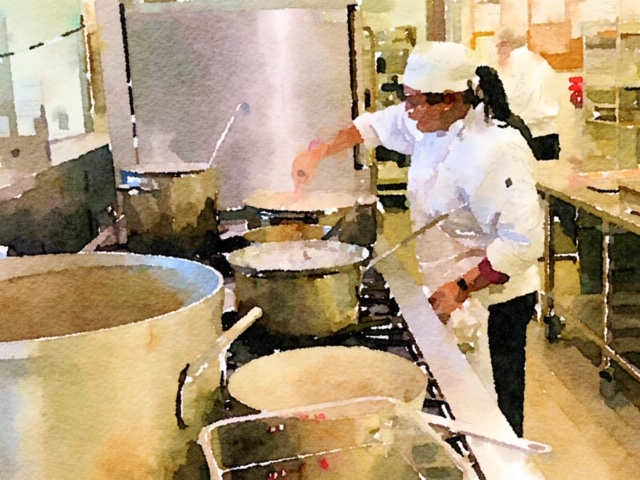
Let’s not confuse freedom with a desire to do whatever we want without a system of order or respect for the discipline of structure. We can both be free and still respect the need for that discipline that comes from organization. A well-run kitchen is not a free-form environment where every cook does his or her own thing or moves to the beat of his or her own drum. Just like other well-run organizations – the kitchen functions best in a system where everyone has well defined jobs, follows the structure of systems or order, and exhibits the discipline of structural respect.
Whether it is the military, your favorite baseball or football team, FedEx, UPS, the airlines, or your favorite musical group – structure and a level of discipline are essential if the end result is going to be accomplishment of business objectives.
My experience, and I will note that it may not be everyone’s experience, is that kitchens tend to attract a broad array of staff members who come from environments where discipline is not always the norm. The refreshing nature of discipline is what attracts many of those great employees to the environment of the kitchen. There is comfort in the ability to achieve concrete objectives – a well-prepared plate of food and a satisfied customer. There is comfort in wearing a clean, crisp, white uniform that represents history, tradition, and pride. There is comfort in following the directives on a prep list, a recipe, or a banquet order. There is comfort in knowing and executing foundational methods of cooking that can consistently yield good results. There is comfort in knowing that there is a chain of command in the kitchen and that following this order creates a sense of team when and where it is needed.
I have recently read articles that claim that the discipline and order of chefs as far back as Escoffier or as contemporary as Ferran Adria or Thomas Keller are no longer appropriate or needed. That this structure that chefs have defended for generations will somehow stifle an individuals opportunities in a kitchen and thwart their ability to grow. Oh contraire, my experience is just the opposite. It is exactly this structure, and this discipline that helps to develop talented, polished individuals and build a skill set that leads to long-term success.
Do not misconstrue this support for discipline as an endorsement of hostile work environments where some chefs have been known to demean and excessively criticize cooks – there is no place for this approach. Discipline is not synonymous with this awful, abhorrent approach that is, for some reason, portrayed as normal on TV kitchen shows. This may have been normal in the distant past, but it cannot be tolerated today. But, a level of discipline and structure is critical, especially in complex, ever changing and time sensitive environments like a busy kitchen.
I have observed kitchens that are highly disciplined while employee centric at the same time. It is these kitchens that hum with enthusiasm, pride, and professionalism and produce extraordinary results. I have seen cooks when they button up those crisp, clean uniforms, tie on an apron, and draw their knives across a wet stone to hone an edge; when they wipe down their station, line up their tools, and pull down an organized prep sheet, and I have watched that spring in their step, that look of focused professionalism that can only occur in a kitchen that respects the order and discipline of the work.
It makes no difference if it is a 4-diamond restaurant offering fine dining, a quality pizza shop, a bakery, or a hospital foodservice – discipline, pride, and results are closely aligned. I have seen cooks from all different walks of life – some from culinary schools, some who worked their way up from dishwasher, some born into an American neighborhood, and some who came to our country for a better life, both male and female, young and at the beginning of their work life and others who are nearing the end of their careers – come together with pride in the work they do, joy in their accomplishments in front of the range, and charged up about the kitchen where they work. This is what discipline and organization bring to a work environment.
Peek into the kitchens of restaurants that you patronize and you can immediately see the difference. In fact, it is likely that the food presented to you as a customer will reveal the level of discipline, professionalism, and organization that exists in that kitchen.
A chef who understands that his or her role is to define that structure, create an environment where critique is tied to training, and results are aligned with the structure and organization that –yes, Escoffier, Pointe, Poilane, Keller, Trotter, and others established or reinforced, is a chef who will not only find personal success, but will set the stage for employees to enjoy a long and fruitful career.
There are many aspects of the restaurant business that need to change: pay scales, benefits, reasonable work schedules, tolerance of chefs and operators who demean and belittle employees, and addressing the factors in restaurants that limit profitability- but, in all cases it will be organization and structural discipline that will make those changes possible.
PLAN BETTER – TRAIN HARDER
Harvest America Ventures, LLC
www.harvestamericacues.com BLOG
CAFÉ Talks Podcast

Leave a comment